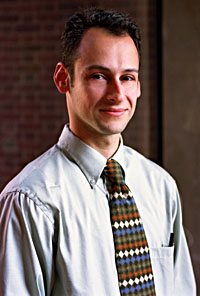 | Dr. Jeffrey S. Schechner |
Dr. Jeffrey S. Schechner, an associate professor of dermatology at the School of Medicine who was instrumental in advancing research on blood vessels in the skin and human skin grafting, died on Sept. 7 in New Haven at age 39.
Dr. Schechner, who also served as director of the Dermatology Service at the West Haven Veterans Administration Hospital, played a key role in the development of an improved tissue-engineered skin that, by incorporating human endothelial cells, would enhance currently available options. He and colleagues developed a new technique for producing artificial skin that is likely to improve the reliability of overall skin graft performance, especially in recipients with impaired blood vessel development such as diabetics and the elderly.
Dr. Schechner discovered how to successfully transplant human endothelial cells in inflammatory diseases to generate microvessel formation in a recipient. He found that human skin could be developed with blood vessels derived from cultured endothelial cells. The key finding in his research was the unexpected effect of the anti-apoptotic protein Bc1-2 on endothelial cell behavior.
Dr. Schechner and his collaborators within Yale's Vascular Biology and Transplantation Program proceeded to develop this discovery as a tool for improved tissue engineering and for reperfusion of ischemic tissues. At the time of his death, he was designing a clinical trial to bring this work to fruition.
"Although we have all been robbed of the many more years of friendship and partnership with Jeff that we had expected, all that we are and can become has been immeasurably enriched by his priceless contributions to our programs and environment," said Dr. Richard Edelson, chair of dermatology and director of the Yale Cancer Center, in a letter to faculty and staff. "Along with his numerous friends throughout the Medical Center, we in the Department of Dermatology are stunned by his loss. His wife Christina's and children Evan and Phoebe's loss dwarfs our own."
As a medical student at Yale, Dr. Schechner developed an interest in vascular biology while doing his thesis research in the laboratory of Dr. Irwin Braverman. He graduated from the Yale School of Medicine in 1991. Following his medical internship at Boston University Medical Center, he completed his residency in dermatology at Yale. As a dermatology resident in 1991-1992 he and Braverman applied laser-Doppler measurements to mapping the skin microvasculature in humans. With support from the Yale Dermatology Post-Doctoral Training Grant, he began, along with his mentor Jordan Pober, to define new directions in human vascular biology. In 1993, with Pober, he studied functional roles of skin endothelial cells in inflammatory diseases and in cutaneous malignancies.
Dr. Schechner is survived by his wife, Dr. Christina Herrick, assistant professor of dermatology at Yale; his four-year old son, Evan; his year-old daughter, Phoebe; his parents, David and Shifra Schechner of Brookline, Massachusetts; and his sister, Miriam Schechner of Queens, New York.
Memorial contributions in Dr. Schechner's name can be made to the Dermatology Foundation, 1560 Sherman Pkwy., Evanston, IL 60201-4808.
T H I S
In Memoriam: Dr. Jeffrey Schechner,
skin graft specialist W E E K ' S
W E E K ' S S T O R I E S
S T O R I E S![]()
 Grant to support research on role of viruses in cancer
Grant to support research on role of viruses in cancer
![]()
![]()
 Series honors graduation of Yale's first Chinese student 150 years ago
Series honors graduation of Yale's first Chinese student 150 years ago
![]()
![]()
 Program marks 35th anniversary of Afro-American Cultural Center
Program marks 35th anniversary of Afro-American Cultural Center![]()
![]()
 Study: Recreational gambling can be good for seniors' health
Study: Recreational gambling can be good for seniors' health
![]()
![]()
 Yale launches $1 million United Way drive
Yale launches $1 million United Way drive
![]()
![]()
 Symposium to explore past and future of suburbanization
Symposium to explore past and future of suburbanization
![]()
![]()
 Event honors late historian of American South
Event honors late historian of American South
![]()
![]()
 New bioscience company at Science Park offering . . .
New bioscience company at Science Park offering . . .
![]()
![]()
 Exhibit showcases work of long-ignored landscape artist
Exhibit showcases work of long-ignored landscape artist
![]()
![]()
 Mayhew lauded for his studies of party politics
Mayhew lauded for his studies of party politics
![]()
![]()
 Congress' only Holocaust survivor to discuss . . .
Congress' only Holocaust survivor to discuss . . .
![]()
![]()
 Noted playwright to speak about his life, Jewish religion
Noted playwright to speak about his life, Jewish religion
![]()
![]()
 Prize-winning poet Adrienne Rich will read from her work
Prize-winning poet Adrienne Rich will read from her work
![]()
![]()
 Older marathon runners are making greater strides . . .
Older marathon runners are making greater strides . . .
![]()
![]()
 Cultivating a culture of trust was topic of inaugural conference
Cultivating a culture of trust was topic of inaugural conference
![]()
![]()
 Dwight Hall interns devote the summer to causes in New Haven
Dwight Hall interns devote the summer to causes in New Haven![]()
![]()
 Reimbursements now available through direct deposit
Reimbursements now available through direct deposit![]()
![]()
 IN MEMORIAM
IN MEMORIAM![]()
 Study shows benefits of treating hypertension in older people
Study shows benefits of treating hypertension in older people
![]()
![]()
 Yale Books in Brief
Yale Books in Brief
![]()
Bulletin Home |
| Visiting on Campus
Visiting on Campus |
| Calendar of Events
Calendar of Events |
| In the News
In the News![]()
Bulletin Board |
| Classified Ads
Classified Ads |
| Search Archives
Search Archives |
| Deadlines
Deadlines![]()
Bulletin Staff |
| Public Affairs
Public Affairs |
| News Releases
News Releases |
| E-Mail Us
E-Mail Us |
| Yale Home
Yale Home